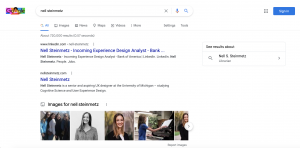Nell Steinmetz
Contents
Introduction
I haven’t always been searchable. When I was 12 or 13 I would search my name on Google and not much would come up, and I was always disappointed. Now, while I wish things were the same, I have come to accept that extreme privacy doesn’t really exist on the Internet unless you don’t use it at all (which comes with its own pros and cons). When I was younger, I would search “Nell Steinmetz” online, and all that would show up was a video from an old piano recital, my name shown in my dad’s website biography, and information about my great grandmother (my namesake). My online presence was barebones when I was 12 years old, but despite it growing over the years, it still only reflects a fraction of who I am.
Search Results
Immediate Findings
Now, things are much different. Too much information about me arises — over 5 pages worth to be exact. I attribute some of this to my not having a common name. If my name was Maggie Smith it would be much more difficult to figure out who I am. However, both my first and last names are uncommon, making it very obvious which information is really about me. It doesn’t seem like there are any other Nell Steinmetzs out there (other than my great grandmother). The first thing that comes up when you search “Nell Steinmetz” is my LinkedIn, followed by my personal portfolio website. This wasn’t very alarming to me, and I didn’t think too much information was available. But after looking through just these two sites for a few minutes, it became apparent that if someone wanted to stalk me for some reason, it wouldn’t be hard to track me down. From my LinkedIn and portfolio site alone, they could figure out my hometown, where I attend school, where I’ll be working and what city I’ll be living in after graduation, my email, and personal phone number. Not to mention my entire work and education history as well as extracurriculars and personal interests.
The Nitty Gritty
They could see from my Medium profile that I had published a blog post for an SI 410 assignment 5 days ago, telling them what classes I’m enrolled in. They could find my public Instagram profile telling them places I have visited recently. They could find my Spotify account and artists I listen to, and even my height from an old field hockey roster. I found my parents names, and both my home and school address — down to the apartment number (though the school address is outdated). Upon adding the keywords “Glen Ridge”, which is my hometown, I quickly found an article about my brothers’ drone business too. There was so much information about me out there, and no way to make it disappear. I’m sure more information would be available via data broker sites, but that information is hidden behind a paywall (of only $23).
Reflecting
After contemplating for a while, I thought about how much of my authentic self was represented by this information. Sure, it’s creepy that this much information about me is instantly available to anyone who wants it, but it’s only about 1% of who I am. When I see someone post on LinkedIn about a new job at Apple, or on Instagram about a vacation to the Caribbean or Italy, I’m jealous. I’m sure most people feel this way as well, and think these people seem to have the perfect life. But what these posts don’t show is how hard that person worked to get that job, all the job applications they submitted that were rejected, failed interviews, disappointing phone calls from recruiters, and endless time spent developing the skills required for that role. They don’t show that maybe the person who posted a photo on vacation had a miserable journey getting to that location, or that perhaps they were fighting with their family the entire day. What the Internet shows society about one person is a facade that only represents their best moments and what they choose to share. It’s as if choosing not to share a moment makes it nonexistent to the rest of the world. If a girl doesn’t post a picture with her boyfriend on Instagram, does she have one at all? Not to the rest of the world. It didn’t take me very long to realize that the information available about me is quite superficial. It only shows a small portion of who I am and the experiences I’ve had in my life.
Missing Information
The fifth result upon searching my name is a singular statistic from my senior year high school track season. It shows that I ran the 400 meter hurdles with a time of 1:33:79, which is considered to be pretty slow. What it doesn’t show is that I was so much slower before. It doesn’t show the countless practices I spent practicing my form, the miles I ran to improve my speed, or the exercises I did to warm-up every day. All it shows is my time. The rest of the results when searching my name are similar. My LinkedIn says that I’ll be working as an Experience Designer at Bank of America come July, but it doesn’t show the 40+ applications I submitted, the rejections, the countless hours I spent perfecting my portfolio, or the entire Thanksgiving break I spent preparing for my final interview. It doesn’t show when I was struggling to find an internship while juggling a full course load, thinking I wasn’t good enough, or my fears of having to drop one of my degrees after failing an exam.
The Truman Show
People post the happy moments in their life because they like praise as well as sharing their accomplishments. They don’t tend to share arguments with friends, family, or roommates. They don’t share the loneliness of self-isolation for two weeks after testing positive for COVID-19. They post pictures smiling in Europe while they study abroad. But they don’t post about being kicked out of classes, or cancelled flights leaving them stranded in another country. People post about college decisions, but not about the schools that rejected them. People want to keep up the facade that they have a perfect life, so they fit in next to everyone else who is doing the same thing.
Searching for someone online might seem like it tells you a lot or even everything about them, but it’s not even close. Search results don’t include the moments of failure that have allowed someone to become the person that they truly are. You don’t know 99% about a person after searching them on the Internet. You don’t know who they’re in touch with on a daily basis, how late they stay up at night, whether they exercise early in the morning, or what they eat for breakfast. In order to attempt to truly understand someone, you would have to put them on The Truman Show (a movie about a man who is constantly filmed without his knowledge and broadcasted on live television at all hours of the day). And even then, you couldn’t hear their thoughts.
Final Thoughts
Once I thought about my search results this way, I realized that people googling me know nothing about me. Unless someone implants a chip in my brain, they will never hear my thoughts or know every single thing about who I am. All people can know is how you present yourself in person and online. In reality, everyone always has moments alone, and nobody knows what goes on in those moments except for you. The only person who can really know who you are is yourself, even if you’re still trying to figure out who that is. Take that Internet!

